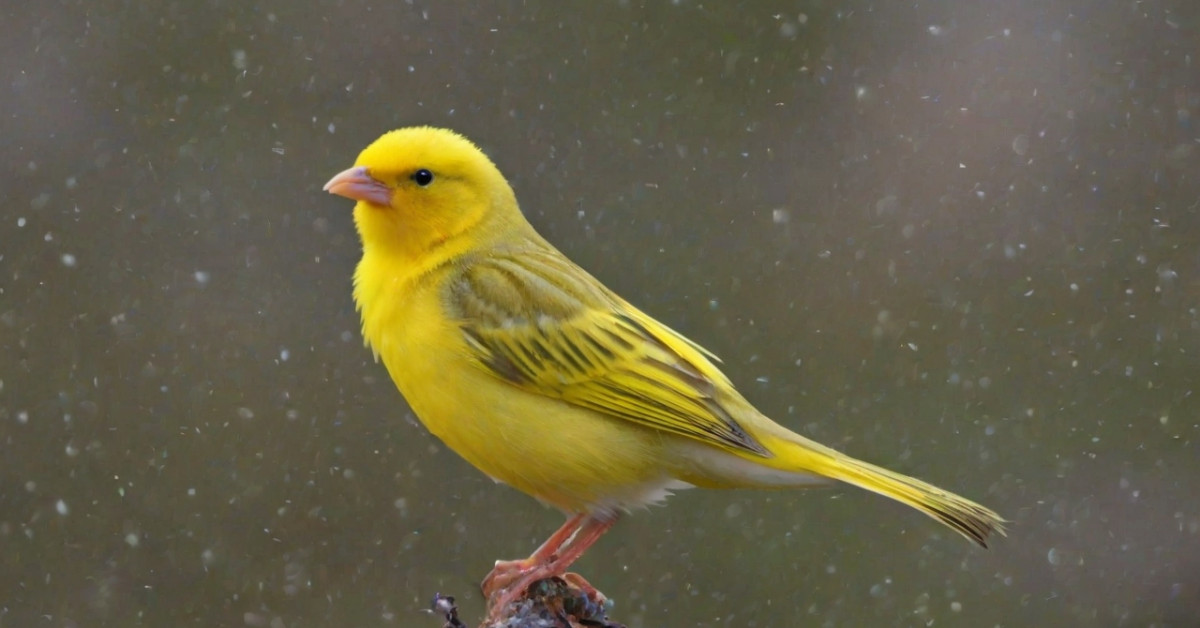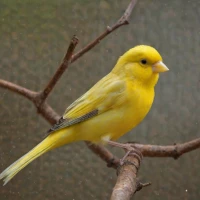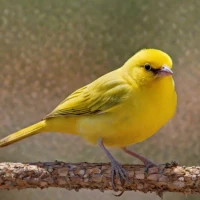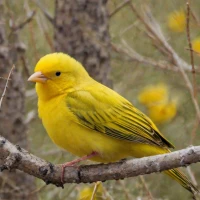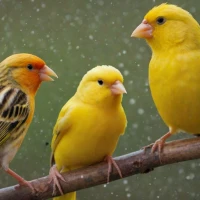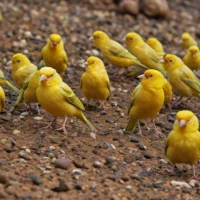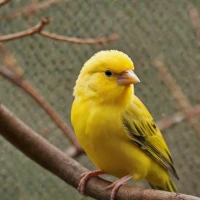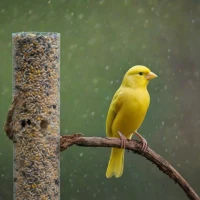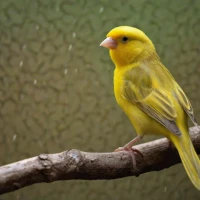A Splash of Sunshine: The Allure of Alaska Canaries
Ever since I was a little kid, there was always something about canaries that fascinated me. Maybe it was their lively song or that vibrant yellow hue that seemed like a splash of sunshine in our living room. I remember my grandmother used to have this magnificent little bird named Sunny. Boy, did Sunny live up to his name! Every morning he’d chirp his heart out, making the room come alive. Those memories still warm my heart. So, let’s dive into the splendid world of the Alaska canaries and uncover what makes these yellow birds so darn special.
The Radiant Yellow Feathered Friends
First off, let’s talk about their radiant, eye-catching color. Alaska canaries, with their striking yellow plumage, are like little nuggets of gold flitting around. Their coloration isn’t just about aesthetics; it’s a result of a genetic factor that prioritizes the yellow pigment. When the sun hits their feathers, it’s like the room gets bathed in a warm, peaceful glow.
Did you know? This bright coloration acts as a natural sunscreen for these birds. Pretty snazzy, right? The pigment actually helps protect their skin from the sun’s harsh rays.
The Origins and Evolution of Alaska Canaries
Alright, let’s get into the nitty-gritty. Breed origins can be a bit convoluted, but Alaska Canaries were primarily bred for their vibrant yellow color. They trace their lineage back to the wild canaries from the Canary Islands (betcha didn’t see that coming), Madeira, and the Azores. Over years, these birds adapted, evolving into the species we adore today.
Interestingly, their name “Alaska” doesn’t come from the region itself. Instead, it’s derived from the term “alba,” meaning white, which signifies their pure coloration bred through generations.
Sassy Personalities: Don’t Let Their Size Fool Ya!
Oh man, these birds are like pint-sized packets of dynamite when it comes to personality. You might think they’re all pretty looks and sweet songs, but there’s so much more. Alaska canaries are known for their playful and curious nature. They zip around their cages with all the nimbleness of a gymnast.
For instance, my buddy Jake has an Alaska canary named Sunshine, who gets up to all kinds of antics. Sunshine loves playing with bell toys, sometimes giving them a gentle nudge and other times, aggressively swinging them about like he’s in a tiny birdy WWE match. He’s also quite chatty, especially when Jake’s around. Birds, it turns out, can be just as sociable as humans.
The Sweet Songs of the Alaska Canary
One of the most appealing aspects of these birds is their singing. Dude, there’s nothing quite like waking up to the melodious tunes produced by an Alaska canary. Their songs carry a unique blend of whistles, trills, and clicks, creating a symphony that’s soothing yet invigorating.
It’s said that the song of a canary is a reflection of its mood. So, if your feathered friend is serenading you every morning, you can be sure they’re one happy camper.
Diet and Nutrition: What Keeps Them Chirpy
So, what do you feed these bundles of joy to keep them as chirpy as ever? Glad you asked! Alaska canaries thrive on a balanced diet that includes a mix of seeds, fresh fruits, and vegetables. A high-quality commercial seed mix forms the basis of their diet. But don’t stop there. Add in some finely chopped fruits and veggies like carrots, apples, and greens. Trust me, they’ll love ya for it.
And a fun fact for ya: Did you know that feeding canaries red bell peppers can slightly tint their feathers to a more orangish hue? Now that’s some cool birdie magic!
Housing and Environment: Creating the Perfect Haven
Creating a comfortable and stimulating environment for your Alaska canary involves more than just a fancy cage. These birds need space to stretch their wings and fly a little—don’t cramp their style! Go for a spacious cage with vertical bars. Horizontal bars can be a hazard if your canary tries to climb them.
Moreover, place the cage in a location where it gets ample natural light but is also protected from direct sunlight and drafts. These birds love a quiet and stable environment. A few toys and perches here and there will keep them entertained and mentally stimulated.
Breeding: The Miracle of New Life
Breeding Alaska canaries can be as challenging as it is rewarding. If you’re thinking of embarking on this adventure, you’ve got to prepare. Firstly, it’s essential to have a healthy and bonded pair. Not all canaries are the same if we’re talking about compatibility. Some might take an instant liking to each other while others—well, let’s just say they would rather stay single.
When breeding, ensure you’re providing a space that’s conducive to nesting. I remember setting up a small breeding cage for my pair and placing a tiny wicker nest inside. The moment I saw the hen arranging her nest materials, it hit me that new life was about to begin. It’s a feeling that’s hard to describe. And once the chicks hatch, boy are they a handful! Keeping them fed and warm becomes a round-the-clock task, but oh so worth it.
Challenges: Not All Sunshine and Rainbows
Sure, these golden beauties bring loads of joy, but let’s be real. Keeping an Alaska canary isn’t all sunshine and rainbows. They’re susceptible to diseases like mites and respiratory infections. That’s a nightmare no bird owner wants to face. Regular vet check-ups and maintaining cleanliness can mitigate some of these risks.
I once had to deal with a mite infestation - let me tell ya, it wasn’t pleasant. Poor little Sunny was scratching incessantly and losing feathers. It took a while, but with consistent care and treatment, he bounced back. So yeah, keep an eye on your bird’s health. Don’t let those cute chirps lull you into complacency.
Training: Not Just Your Average Bird Brain
You might think that training a canary is a fruitless endeavor, but boy would you be wrong! While they’re no parrots, these smart little cookies can learn a few tricks. Training them can be a hoot of an experience. Starting with basics like getting them to perch on your finger— it can take some time and a lot of patience.
Positive reinforcement is key. Use tiny treats to encourage the behavior you want to see. Over time, you’ll notice they become more accustomed and will start trusting you more. Seeing that progress feels like winning the lottery!
The Social Side: Canaries Love Company
Contrary to popular belief, canaries aren’t necessarily solitary creatures. In fact, they enjoy the company of their own kind. However, if you’re planning on keeping multiple canaries, make sure you’ve got ample space. They need enough room to spread their wings—literally and figuratively. 🐦
Oh, speaking of companionship, my friend Carolyn has this cute pair of Alaska canaries, Lemon and Sugar. They’re inseparable, always nuzzling up together and serenading in duet. It’s like watching a tiny avian love story unfold!
The Emotional Connection: Feeling Blue? Listen to the Canary
What’s fascinating is the emotional connection you develop with these little feathered friends. Their songs, their behaviors, even their quirks—they all start to feel so familiar. It’s almost therapeutic. I often find myself talking to my canary after a long day. It’s like having a tiny, non-judgemental therapist who also happens to be good at singing.
When I faced some tough times, Sunny’s songs were a comforting constant. It’s hard to stay down when there’s such cheerful tunes filling the air. Maybe it’s just me, but having a pet canary can genuinely boost your mood and well-being.
Why Choose an Alaska Canary?
So, why should you go for an Alaska canary? Well, if their dazzling yellow feathers and melodic tunes haven’t convinced you, consider this: they’re relatively low-maintenance yet incredibly rewarding pets. They don’t need constant attention, but they’ll shower you with beautiful song and cheerful antics.
And here’s a zinger for ya: canaries were historically used in coal mines to detect harmful gases! Their sensitive respiratory systems made them a real-life early warning system. Now, they’re bringing joy into homes instead of saving miners—quite the career shift, eh?
Personal Reflections
Finally, having an Alaska canary has been one of the most rewarding experiences of my life. The joy they bring, the songs they sing, and the occasional mischief they get into, all make life just a tad brighter. If you’ve got the space and the heart, adopting one of these vibrant wonders can be a real game-changer for your household.
In closing, thanks a mil for tuning into my musings on these fantastic yellow marvels. 🐥 If you’re thinking about getting one, just remember—every chirp, every flutter, is a little piece of sunshine in bird form. Keep it chirpy, folks!
